

Family Run Local Business * Professional Service * Competitive Prices * Quality Assured





Copyright © Fire & Electrical Solutions Ltd -
Website Design by Happy Websites
“We pride ourselves on our Competitive Prices and Professional Service”

Electrical Safety
How old is your Wiring?
Faulty & ageing wiring is one of the major causes of electrical fires in the home.
This can be avoided by finding out the age of the wiring-
There are several ways to determine the age of the electrical installation:-

Here is some useful information and articles about Electrical Safety.
Electrical Hazards
Electrical hazards are invisible but deadly, causing fires and electrical shocks.
These hazards are easily preventable if you use an NICEIC-
Government figures estimate that each year there are around:
10 fatal and 2,000 non-
19 fatal and 880 non-
There are also about 12,500 electrical fires in homes across the UK each year. Although
many incidents are caused by faulty appliances rather than the electrical installation
itself, a properly installed and well-
Cables, switches, socket-
Whilst it is relatively easy to make an electrical circuit work – it is far more tricky to make the circuit work safely. To avoid the dangers that electricity can create it is essential that electrical work is carried out only by those with the correct knowledge, skill and experience in the type of electrical work to be undertaken.
The Electrical Safety Council published the results of their National Consumer Survey and found that:
•42% of those surveyed stated they had never had their electrics checked
•32% of DIYers stated they had experienced one or more electric shocks while carrying out DIY
•59% of people do not use qualified electricians when carrying out electrical work
•48% of those surveyed did not know that their electrics should be checked at least every 10 years
Electrical Safety Laws
NICEIC registered electricians have already helped to improve the standard of electrical
work in the UK. An electrical safety law, Part P of the Building Regulations, was
introduced by the Government on 1st January 2005 with the aim of further enhancing the
protection of homeowners and reducing the risk of electric shock when using electricity.
The law, which applies to England and Wales aims to improve electrical safety in the
home and prevent the number of accidents, which are caused by faulty electrical work.
This brings electrical work in the home under statutory control along with other types of
building work, such as gas installations.
The law requires an electrician registered with a government-
as the one operated by NICEIC, to carry out most electrical work in the home. After
completion of any work your NICEIC registered electrician will issue you with an electrical
safety certificate and a Compliance Certificate to confirm it meets the requirements of the
Building Regulations.
You can only carry out electrical work yourself if you can inspect and test that it is safe for
use. To comply with the law you must notify your local building control office before you
begin any work and pay the appropriate fee for them to inspect the work.
What will happen if you don’t follow
the regulations?
You will have no certificate to prove that the work has been carried out by a registered
electrician, or that the work performed has been passed as safe by your local
building control.
It may be problematic when it comes to selling your home if you cannot produce
evidence that electrical work has been carried out in accordance with the
Building Regulations.
It is a criminal offence to carry out work that does not comply with building regulations,
with a maximum fine of £5,000.
Your local building control may insist that you re-
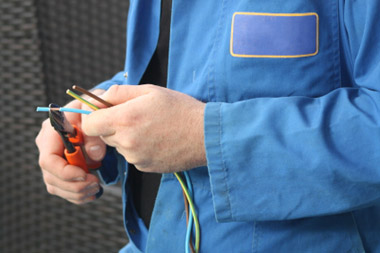
- Cables coated in black rubber phased out in 1960’s
- Cables coated in lead or fabric pre 1960’s
- Fuse box with a wooden back, cast iron switches pre 1960’s
- Older round pin sockets and round light switches, braided flex hanging from ceiling roses, brown and black switches and wall mounted switches in bathrooms pre 1960’s
Cables run through walls, fuse boxes are hidden away in cupboards, making it easy to forget that the electrical wiring does need checking periodically. Cables, sockets and switches all deteriorate with use and over time and require regular checking.
All domestic houses should have their electrical wiring checked at least every 10 years.

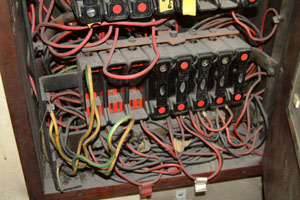
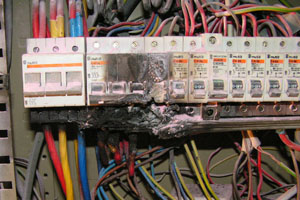
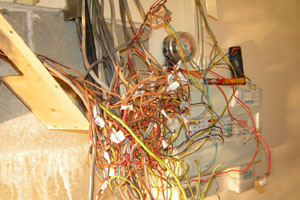
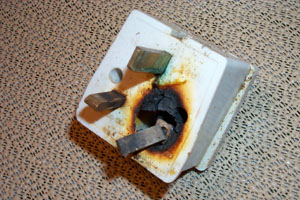
Here are some examples of Electrical Hazards and bad wiring!





